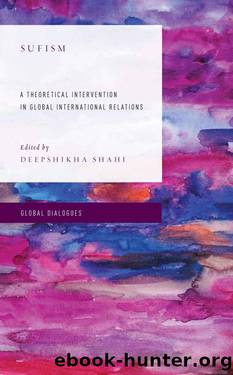Sufism (Global Dialogues: Non Eurocentric Visions of the Global) by Unknown

Author:Unknown
Language: eng
Format: epub
ISBN: 9781786613868
Publisher: Rowman & Littlefield Publishers
Published: 2020-06-21T18:30:00+00:00
Concluding Remarks
On the grounds of an integrated approach to âtextual analysisâ and âcontextual analysisâ of doctrines and practices of some great Sufi mystical thinkersâ namely, Ibn SabâÄ«n, Ibn al-âArabÄ«, and Ibn âAá¹Äâ AllÄhâwho could be associated, though with partly different attitudes, to the emergence (if not expression) of the notion of âoneness of reality/unity of beingâ (waḥdat al-wujÅ«d) during the seventh Islamic century (thirteenth century AC), this chapter comes to the conclusion that the applicability of this notion for the study of Global IR is not free from problems. Indeed, a critical inspection of the heritage of aforementioned Sufi mystical thinkers in Late Ayyubid and Early Mamluk period in Egyptian history discloses that this was the most favorable period for the so-called compromise between Sufism and philosophical Ashâarite theology. However, this period offered a vibrant space for not only interfaith contacts but also interfaith conflicts. Although a âtextual analysisâ of the notion of âoneness of reality/waḥdat al-wujÅ«dâ is often associated with another notion, that is, the âunity of religionsâ (waḥdat al-adyÄn), the âcontextual analysisâ does not seem to establish any regular connection between the two notions. In other words, the centrality of discussions on âoneness of reality/waḥdat al-wujÅ«dâ does not confirm a necessary outreach of the reality of âunity of religions/waḥdat al-adyÄn.â In fact, the Sufis in the concerned historical period, as in many other historical periods, took varied attitudes on the issue of interfaith contacts, as well as on various more specific mystical themes. But these Sufi trends/doctrines/practices (under the textual label of tasawwuf) were uniformly self-defined as âMuslim,â and even those Sufi masters who supported the perspective of the âunity of religions/waḥdat al-adyÄnâ on a transcendental level (such as Ibn al-âArabÄ«) did pay attention to the religious divides and socioreligious hierarchies on the concrete level of the world of manifestations. In this light, one faces some doubts on the universal potential of Sufism, inasmuch as even the theory of âunity of religionsâ seems to focus less on abolishing the boundaries between different religions and more on expanding the boundaries of one determined religion (i.e., Islam) so as to encompass all other religions. Thus, on a more theoretical level, the contextual analysis undertaken in this chapter warns that Sufismâdespite its textual emphasis upon âepistemological monismâ (or the idea of âonenessâ flowing from a possible subject-object merger)âmight reinforce an âIslamo-centric dualismâ between subjective-human-inspiration and objective-divine-revelation.
Download
This site does not store any files on its server. We only index and link to content provided by other sites. Please contact the content providers to delete copyright contents if any and email us, we'll remove relevant links or contents immediately.
The History of Jihad: From Muhammad to ISIS by Spencer Robert(2628)
Nine Parts of Desire by Geraldine Brooks(2368)
The Turkish Psychedelic Explosion by Daniel Spicer(2356)
The First Muslim The Story of Muhammad by Lesley Hazleton(2271)
The Essential Rumi by Coleman Barks(2046)
1453 by Roger Crowley(2030)
The Last Mughal by William Dalrymple(1857)
Trickster Travels: A Sixteenth-Century Muslim Between Worlds by Davis Natalie Zemon(1847)
Muhammad: His Life Based on the Earliest Sources by Martin Lings(1646)
God by Aslan Reza(1641)
by Christianity & Islam(1632)
A Concise History of Sunnis and Shi'is by John McHugo(1567)
No God But God by Reza Aslan(1545)
Magic and Divination in Early Islam by Emilie Savage-Smith;(1534)
The Flight of the Intellectuals by Berman Paul(1503)
Nothing to Envy by Barbara Demick(1450)
Art of Betrayal by Gordon Corera(1430)
What the Qur'an Meant by Garry Wills(1394)
Getting Jesus Right: How Muslims Get Jesus and Islam Wrong by James A Beverley & Craig A Evans(1342)
